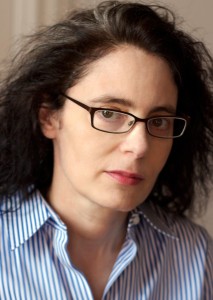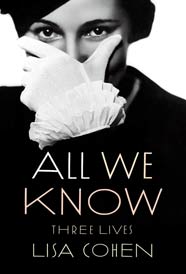5 Questions With . . . Lisa Cohen on Teaching and Writing

In this issue of The Wesleyan Connection, we ask “5 Questions” of Lisa Cohen, assistant professor of English and faculty fellow in the Center for the Humanities. Cohen is the author of All We Know: Three Lives, an engrossing biographical triptych about three complicated, glamorous, independent, and influential women of the last century (published by Farrar, Straus and Giroux in July 2012).
In a review of her new book in Businessweek, Craig Seligman writes:
“ ‘All We Know’ is really much more about reflecting on lives … than about chronicling them. Experimental biography, if such a genre can be said to exist, is a high-wire act. Cohen never loses her balance.”
Q: What courses have you taught at Wesleyan and which have you enjoyed teaching the most?
A: I teach the sequence of nonfiction workshops in the English Department: Techniques of Nonfiction, Intermediate Nonfiction Workshop, and Advanced Nonfiction Workshop. I also teach a Special Topics course on biographical writing, and courses such as Stein and Woolf, and Fictions of Consumption. This fall at the Center for the Humanities, I will offer a course that engages with the semester’s theme of “Temporality.”
It’s impossible for me to say which I’ve enjoyed teaching the most. I love teaching Wesleyan students—and partly because of them, every time I teach “the same” course it’s a new experience. But the workshops also vary every year because I assign different texts and because every semester we bring different, exciting writers to campus. Alison Bechdel, Lisa Jarnot, and Bernard Cooper are three of the several who will be giving readings and meeting with students this fall.
Q: What do you believe about writing that you have shared with your students?
A: Revise!
Read writing that inspires and challenges you.
Write about what really matters to you and do it so well that it is compelling to others.
Keep editing your work.
Be strict with yourself, but patient with your own process.
Q: How did you decide to write about the lives of these three separate women—Esther Murphy, Mercedes de Acosta, and Madge Garland—in your new book?
A: I started writing a book about Madge Garland and spent several years doing archival research and conducting interviews about her life. But at a certain point it became clear to me that while I could write a whole book about her, such a book would, ironically, not quite do her justice. Her life was one of accomplishment, but a lot of what she had done was hard to pin down. The same was true for my other subjects. I wanted to say something bigger about the milieu in which Madge had moved, to show what certain women’s lives looked like in the 20th century, and to emphasize previously unseen connections—and the often intangible work of making connections among people, which was work they had all done. In the meantime, I had written a magazine profile of Mercedes de Acosta and was hearing about Esther Murphy from the writer Sybille Bedford (whom I had first met because I interviewed her about Madge Garland).
I realized that the book had to be a triptych, not a single portrait. These three women were all friends and contemporaries, so that choice made sense, but what really motivated me was the difficulty and interest of writing about three people whose work was at once central and marginal, concrete yet ephemeral—and whose work lives and love lives made it possible to think about transatlantic modernism in some new ways.

Juxtaposing their stories also made it possible to argue implicitly against the idea of individual genius—of course I’m not the first person to do this. It also allowed me to keep asking questions—What is the most interesting way to narrate a life? How do we account for the traces that people leave behind? What is failure and what is accomplishment? What and who is important?—that interested me, and to ask them in different ways in each portrait. These were the significant questions that their lives raised so dramatically—and yet Esther Murphy, Mercedes de Acosta, and Madge Garland themselves were not seen as significant people. Putting the three of them in the same book made it possible to tackle that paradox.
Q: What challenges did you face in your research? What surprising discoveries did you make along the way?
A: There were the challenges of time and money, of course—it took me many years to write the book I wanted to write. There was the challenge of doing the equivalent of research for three biographies. As for your second question: One makes surprising discoveries every time one walks into an archive. That has something to do with how one approaches one’s material—indeed what one considers one’s material. Two big discoveries: Finding a huge cache of Esther Murphy’s papers at the Library of Congress. Being given a trove of Madge Garland’s wartime letters to her brother, when I went to Melbourne to meet her nephew.
Q: What are a few of your favorite biographical works and why?
A: I have loved Hilton Als’ The Women; Julia Blackburn’s book about Napoleon on Elba, The Emperor’s Last Island; Geoff Dyer’s Out of Sheer Rage, about D. H. Lawrence and his own attempt to write about Lawrence; Richard Holmes, Footsteps: Adventures of a Romantic Biographer; Georgina Kleege’s, Blind Rage: Letters to Helen Keller; Wayne Koestenbaum’s Jackie Under My Skin; Suzannah Lessard’s book about Stanford White and his family, which is her family, The Architect of Desire; Nell Irwin Painter’s study Sojourner Truth: A Life, A Symbol; Brenda Wineapple’s double portrait of Gertrude and Leo Stein, Sister Brother. All of them are interesting experiments of one kind or another.
But I would also say that every biography, if it is not a rote recitation of facts (whatever they might turn out to be, and however you might construe that category), if it is an empathetic and critical and ethical and imaginative work, as it must be—if it is a work of “recreative” writing, as the biographer Michael Holroyd has called biography— is some kind of experiment. I am interested in people who write imaginatively about hard-won historical detail.

